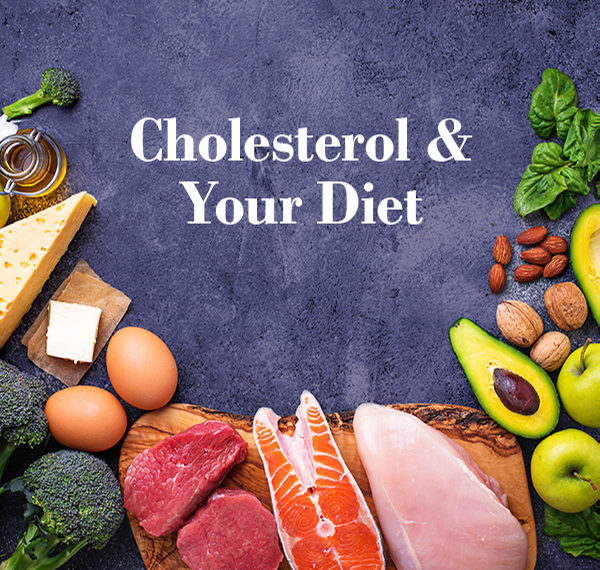Are you aware of all the facts about cholesterol? High cholesterol often has no symptoms and the only sure way to detect it is a blood test. When it comes to your heart, maintaining optimal cholesterol levels can lower the chances of getting heart disease or having a stroke. However, in order to do this, you must know your cholesterol numbers.
High cholesterol can be inherited but is often the result of unhealthy lifestyle choices, which makes it preventable and treatable.
What exactly is cholesterol?
Cholesterol is a waxy, fat-like substance that is found in all the cells in your body. It has an important function as your body needs cholesterol in small amounts to make hormones, vitamin D, and to help with digestion. Your body produces approximately 80% of the cholesterol you need on its own, while the remaining 20% comes from the foods you consume.
Cholesterol travels through the blood via proteins called lipoproteins. One type, low-density lipoprotein (LDL) cholesterol is often referred to as “bad” cholesterol since a high LDL level leads to a build-up of cholesterol in your arteries. Another type, high-density lipoprotein (HDL) cholesterol, is commonly known as “good” cholesterol. It carries harmful cholesterol from other parts of your body back to your liver, which then removes the cholesterol from your body.
What are the risks of having high cholesterol?
High cholesterol can cause the development of fatty deposits in your blood vessels. These deposits grow, thus restricting blood flow through your arteries. On some occasions, those deposits can dislodge from the artery walls, causing a clot that can lead to a heart attack or stroke.
How can your diet help manage your cholesterol?
The best way to treat high cholesterol is with heart-healthy lifestyle changes and if needed, medicines as recommended by your doctor. These lifestyle changes include healthy eating and weight management.
No one single food type can make you magically healthy, so your overall dietary pattern is more important than specific foods. Instead of fried, processed food, packaged meals, and sugary snacks, a heart-healthy diet is built around “real,” natural food.
Which foods are high in cholesterol and should be avoided?
- Foods containing saturated fats. Saturated fats are naturally occurring fat molecules that can increase your cholesterol levels and therefore your risk for heart disease. Some examples of foods with high saturated fats are fatty beef, lamb, pork, dairy products made from whole or reduced-fat milk, and saturated vegetable oils.
- Foods containing trans fats. Trans fats are a type of unsaturated fat that have been linked to heart disease. Foods that are high in trans fats and should be avoided include packaged cookies, cakes, pastries, potato chips, commercially fried foods, buttered popcorn and any products that contain partially hydrogenated or hydrogenated vegetable oils.
- You increase your risk of heart disease by consuming too much alcohol. Excessive alcohol consumption can increase your risk for heart disease as it can lead to lead to weight gain and increase your blood pressure and triglyceride levels.
Which foods help lower cholesterol and are heart healthy?
- Soluble fibre. Foods high in soluble fibre help prevent your digestive tract from absorbing cholesterol. These foods include whole-grain cereals, fruits, vegetable and legumes.
- Fish that are high in omega-3 fatty acids. These acids may help to raise your HDL level and can also protect your heart from blood clots and inflammation, reducing your risk of heart attack. Fish that are a good source of omega-3 fatty acids include salmon, tuna and mackerel.
- Almonds, walnuts and other tree nuts can improve blood cholesterol. Since nuts are high in calories, a handful is a good portion size to have.
- Avocados are also a great addition to a heart-healthy diet as they can help improve LDL cholesterol levels for persons who are overweight or obese.
Adopting heart-healthy dietary changes can have powerful positive effects if you suffer from high cholesterol. Even if your cholesterol levels are under control, the right diet can help prevent their increase.
Sources:
https://www.healthline.com/nutrition/trans-fat-foods#section1
https://www.health.harvard.edu/heart-health/how-its-made-cholesterol-production-in-your-body
https://www.webmd.com/cholesterol-management/guide/hdl-cholesterol-the-good-cholesterol#1
https://www.mayoclinic.org/diseases-conditions/high-blood-cholesterol/symptoms-causes/syc-20350800
https://medlineplus.gov/cholesterol.html
https://www.medicalnewstoday.com/articles/317332.php
